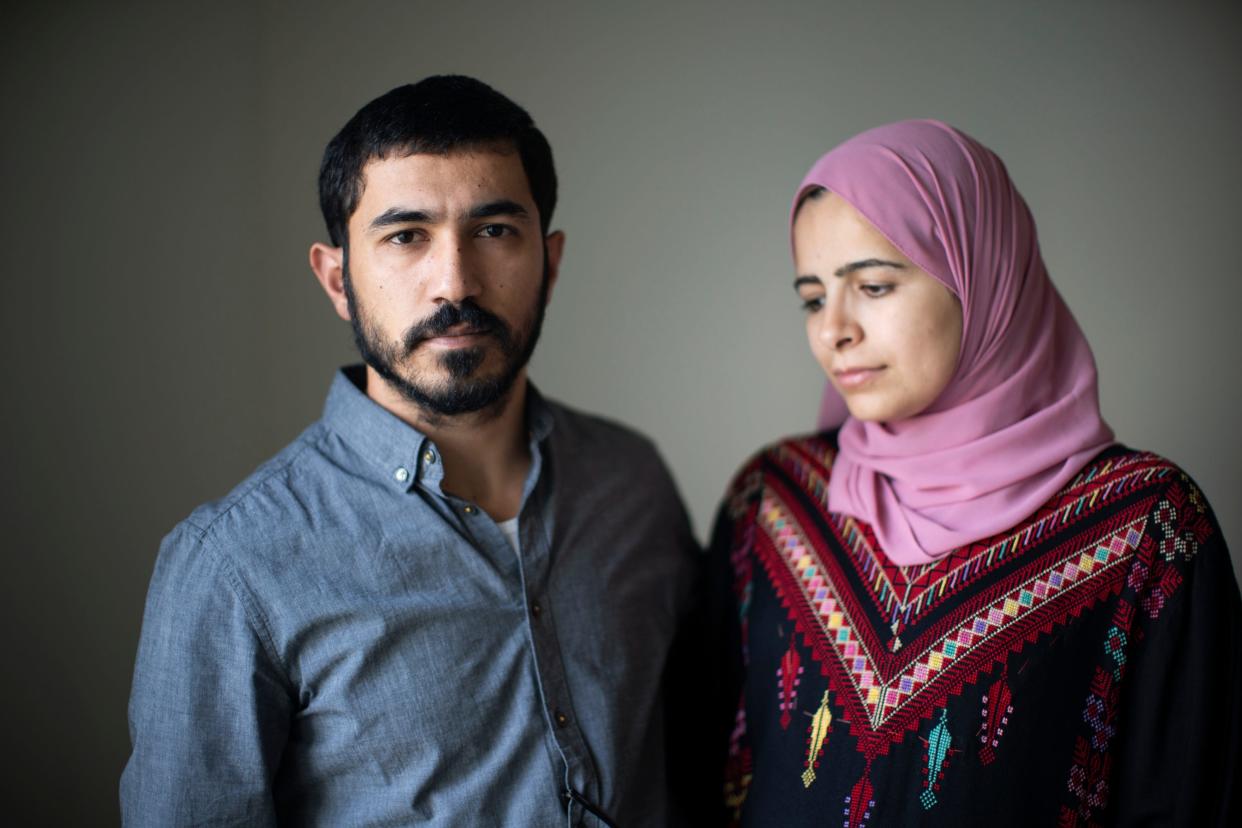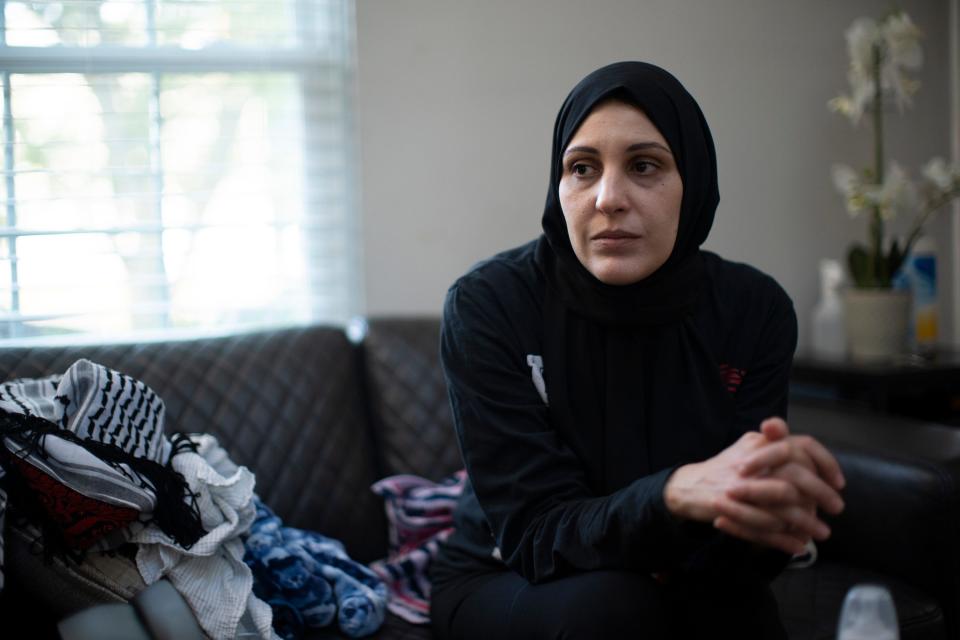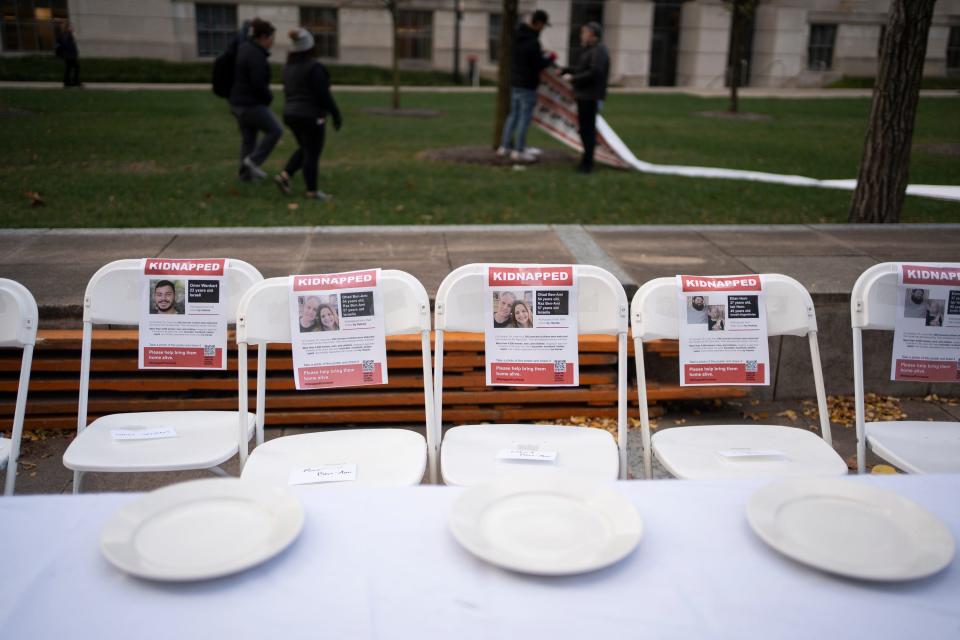‘We are as important as anyone else’: Palestinian Americans react to Gaza invasion

Gaza seemed like a world away from Selmein Isleem’s quiet living room in Dublin, where the late afternoon sun streamed in through a skylight.
But after her aunt and first cousin — a promising high school student named Al-Shaima Saidam — were killed by an Israeli airstrike several weeks ago, Gaza has been all Isleem can think about.
“Sometimes my baby vomits my milk,” Isleem, 36, explained recently, cradling her newborn son Mohamed on her sofa. “I believe it is something inside me — my emotions reflect into him.”
She still agonizes over the fate of her mother, siblings and other relatives who remain in Gaza. Her mother-in-law, Columbus resident Zohdia Isleem, was visiting several of her children and grandchildren who live in Gaza when the war broke out and has been trapped there since.
Isleem is one of thousands of Palestinians in Greater Columbus who feel a personal connection to the events unfolding more than 6,000 miles away. Many local Palestinian Americans from Columbus have family members in the West Bank or Gaza, and at least one Columbus resident is trapped there.
Columbus is also home to a large Jewish community, many of whom maintain ties to Israel and have seen loved ones affected.
The latest cycle of violence began after Hamas launched a surprise attack on southern Israel, killing around 1,400 people — mainly civilians — and taking more than 230 hostages into Gaza. Israel has since pounded Gaza with airstrikes and launched a ground invasion. Nearly 1.5 million Gazans have been displaced from their homes and more than 9,000 Palestinians, mostly civilians, have been killed, according to Gaza’s Ministry of Health, which is led by Hamas.
Although the Israeli government accuses Hamas of inflating civilian casualties — such as after an explosion at al-Ahli Hospital on Oct. 18 that was likely caused by a rocket fired from Gaza — many experts say the Gaza Health Ministry’s figures are generally reliable and point out that they have been corroborated by the UN in past wars.

‘I don’t know how I’m living’
Shereen Amro, a Palestinian American pharmacist who lives in Dublin, said that after her brother’s apartment building was destroyed in an airstrike, he fled from northern to southern Gaza with his wife and four children, who range in age from 2 to 11.
“The bombing is everywhere. There is no specific target or specific group — it’s just everywhere,” Amro said. “I don't know what he's gonna do now that he is homeless … but right now we're just thinking about the (current) moment.”
Mahmoud Algharabli, 31, a pharmaceutical researcher in Dublin who immigrated to the U.S. in 2017, said his mother and 19 family members have been forced to move locations five times since Oct. 7. They are now staying with 50 other people in a 7,000 square-foot plot of land in southern Gaza, where they cook on a campfire outdoors.
“With all of these (past) wars, I never ever saw (my mother) crying. But the last time when I called her … she was crying like a baby,” Algharabli said.
Isleem’s sister-in-law, Hadeel Isleem, 23, a Columbus State nursing student, said the stress had made studying for her exams nearly impossible.
“I would rather be with (my family in Gaza) than being here. Because every time I open the news, I just check for my family,” she said. “I don’t know how I’m living.”
‘They have to get those hostages out’
On Ohio State University campus on Wednesday, the Chabad and Hillel Jewish students’ organizations created a somber Shabbat dinner table installation with more than 200 empty seats to recognize the hostages held by Hamas.
“Jewish culture has such a heavy emphasis on family, and togetherness, and (the hostages’ families) don't have that opportunity right now,” said Jessica Lebowitz, a fourth-year undergraduate who helped create the installation.
“It's just as painful to see Palestinians die as it is to see Jewish people die,” Lebowitz said.

Jordan Vandersluis, a third-year student, said she knew Omer Neutra, a Hamas hostage who is originally from New York, from an international Jewish youth group.
“There's nothing like looking on the news, seeing that 200-plus (people) … were kidnapped and that one of them was your friend,” she said.
Vandersluis said she and other Jewish students had put up posters around campus raising awareness about the hostages, but many of them had been torn down, leaving her feeling silenced.
Sarah Deitsch, the program coordinator for Schottenstein Chabad House at Ohio State, said rescuing the hostages should be a priority for Israel.
“We care about civilians, but ultimately, they have to get those hostages out. If some civilians who … might stand as human shields for Hamas end up getting killed. It's very, very sad. And those hostages need to be released in one piece,” she said.
‘We are as important as anyone else’
But to Algharabli, the Palestinian American medical researcher, the killing of thousands of Palestinian civilians cannot be justified.
“We are as important as anyone else, and killing Palestinians in the claim that the enemy is holding them as a human shield — that's no excuse,” he said.
Amro, the pharmacist, said she felt the U.S. has enabled Israel to do whatever it wants.
“So far, thousands of children died in Gaza and all we can hear is ‘Oh, Israel has the right to defend itself,’” she said. “Defend itself against who? Against children?”
Selmein Isleem said she had supported President Biden in the past but would not vote for him again.
Her father-in-law, Mohammed Isleem, 67, a former Ohio State education professor, said that many Gazans fear permanent displacement. A large proportion of Gaza’s residents are the descendants of refugees who left Israel in the 1947 Arab-Israeli War and were never allowed to return. Many think that if they leave their homes now, they will become refugees once again, Mohammed said.
Although some American citizens have been able to flee Gaza to Egypt in recent days, Mohammed Isleem was not sure his wife Zohdia, who remains in southern Gaza, would be willing to leave without her grandchildren, who lack foreign passports.
“If you (tell) a mother, ‘Hey, you can get out, but you have to leave your kids and grandchildren,’ (do) you think she's gonna leave her kids and grandchildren?” said his son, Fady Isleem.
Note: a previous version of this article misspelled the name of Selmein Isleem's cousin. The correct spelling is Al-Shaima Saidam.
Peter Gill covers immigration, New American communities and religion for The Dispatch in partnership with Report for America. You can support work like his with a tax-deductible donation to Report for America at:bit.ly/3fNsGaZ.
pgill@dispatch.com
This article originally appeared on The Columbus Dispatch: Columbus' Palestinian Americans react to Gaza invasion

